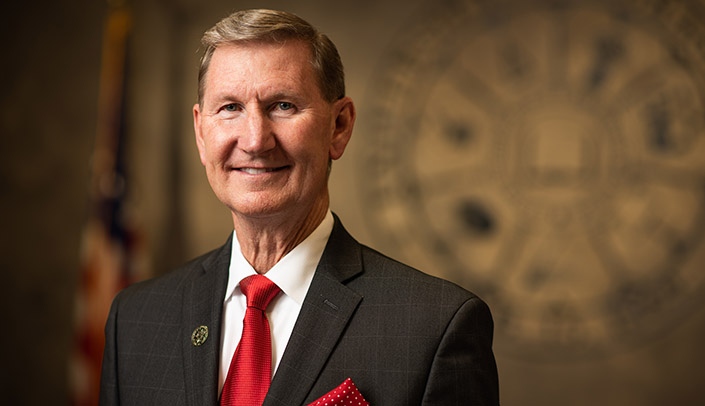University of Nebraska President Ted Carter announced Thursday that tuition rates across the NU system will be frozen in the 2021-22 and 2022-23 school years, another step to ensure affordability and predictability for students and families as they plan for the future.
The two-year tuition freeze in the next biennium — the first back-to-back, across-the-board freeze in recent history at the University of Nebraska — applies to undergraduate, graduate and professional students; resident and nonresident students; and those attending in-person and online.
With the freeze, all NU campuses will remain among the best values in their peer groups — a critical commitment to Nebraskans at a time when higher education is increasingly linked to individual growth and economic prosperity, Carter said.
“Now, more than ever, the affordability, accessibility and excellence of a University of Nebraska education must be our North Star,” Carter said. “We know this is an uncertain time, and we want to do everything we can to take care of the people of Nebraska and give them a sense of predictability about what’s ahead.
“This two-year tuition freeze represents our commitment to current and future students of the University of Nebraska. Now they know exactly what they will pay in tuition to attend our campuses. And, it’s a promise to our state. Job growth will return. When it does, we’ll have a strong pipeline of skilled workers ready to lead Nebraska into the future.”
University of Nebraska at Omaha student body president Jabin Moore said: “Almost every student I know is working hard to pay for their education. Every dollar matters. By freezing tuition for two years, the University of Nebraska is sending a powerful message to young people who dream of improving their life with a college degree. I’m so excited to see the impact of this decision.”
Carter will hold the line on the 2.75 percent tuition increase for 2020-21 that was approved by the Board of Regents last year. While the university system faces significant budget challenges resulting from the COVID-19 pandemic, all campuses and central administration will tighten their belts rather than seek further increases from students and families, Carter said. Steps already underway include a system-wide hiring freeze, limits on spending and a review of all construction projects. Carter will provide a detailed review of the university system’s budget planning at the June 26 Board of Regents meeting.
“The price tag of higher education is one of the most important issues on students’ minds today. I cannot begin to describe how important this decision to universally freeze tuition prices will be for students and the financial hardships many are facing,” said University of Nebraska-Lincoln student body president Roni Miller. “This tuition freeze is going to directly benefit students and their families, a much-needed light of better days to come in this time of unprecedented challenges.”
With Carter’s announcements, most Nebraska undergraduates will pay the following per credit hour for the next three academic years:
- University of Nebraska-Lincoln: $259
- University of Nebraska at Omaha: $235
- University of Nebraska at Kearney: $209
- Nebraska College of Technical Agriculture: $139
Differential tuition rates charged by some academic colleges also will be frozen for 2021-22 and 2022-23. Tuition rates at UNMC vary by college; those will be frozen as well.
“Even during difficult times like this, the University of Nebraska is resolved and committed to students and stakeholders across the state. This tuition freeze represents an incredible show of support and couldn’t have come at a more vital time,” said University of Nebraska at Kearney student body president Max Beal. “Now more than ever, a university degree is obtainable for everyone. What a great day for students and families across the state, and what a great day to be a Nebraskan.”
Board of Regents Chairman Jim Pillen of Columbus applauded Carter’s focus on affordability and accessibility.
“As President Carter says, this is a transformative period for higher education. We have an opportunity now to decide what kind of university we want to be for the future,” Pillen said. “I’m so proud of our university for putting access at the top of the list. What a special message of hope for young people in Nebraska and beyond.”
UNMC student body president Tom Schroeder said: “Talented, well-rounded leaders who are able to think critically and creatively are needed now more than ever as we navigate through and beyond this pandemic. Proactive steps like this by the University of Nebraska system will ensure all Nebraska students have access to a high-quality education to attain those critical sills at a more affordable price.”
Today’s news is the latest in a series of steps taken by Carter and university leadership to provide as much clarity as possible for students and families facing uncertainty amid the pandemic. Carter stressed that the current crisis has not changed the value of higher education, in terms of both individual and economic growth. The on-campus experience is particularly valuable in preparing the next generation of well-rounded, highly skilled leaders.
To that end, Carter has announced that the University of Nebraska’s four campuses will be open in the fall for in-person learning. While adjustments will be necessary to ensure safety, the decision provides clarity for current and future students.
Carter also previously launched the Nebraska Promise, an expansion of the NU system’s existing need-based financial aid program that will cover full tuition costs for Nebraska students with family incomes of $60,000 or less. The Nebraska Promise is expected to cover an additional 1,000 current and future students.
“These are challenging times, but as I have quickly come to learn, Nebraskans are problem-solvers, not problem-gazers,” Carter said. “We have an opportunity now to lean in to our priorities — the first of which is affordable excellence for the people of Nebraska — so that we emerge even stronger, even more relevant, and even more ready to meet the needs of our state and the world.”
